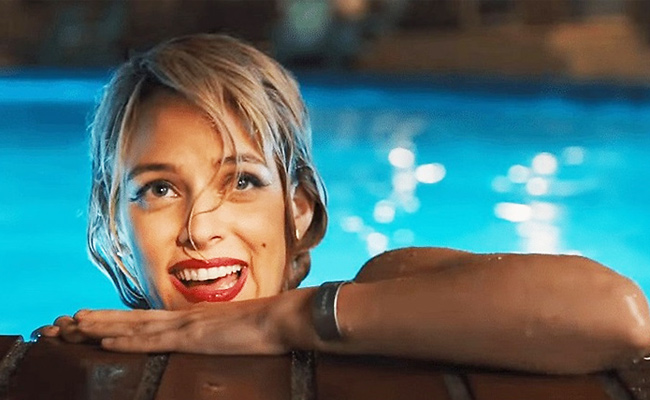
Like Jordan Peele’s Us, Under the Silver Lake is an acclaimed writer/director’s follow up to his breakout horror hit, in this case Robert David Mitchell’s first effort after 2014’s It Follows. Like Peele’s Us, Mitchell’s Under The Silver Lake (named for the hip, or formerly hip, east side artsy neighborhood of LA) is more genre, more classical filmmaking technique, less easily parsed than its predecessor. But whereas Us received a massive marketing push and ended up becoming one of the most successful movies of all time, Under the Silver Lake has had its release date pushed twice and now finally limps into limited release three days before it hits VOD.
I assume this lack of studio confidence comes down to Under The Silver Lake being hard to understand and even harder to categorize. Where Us is taut and sleek, Under The Silver Lake is wild, woolly, expansive. It’s a satire of contemporary L.A. life delivered in the form of a classic L.A. noir, complete with a Golden Age-style score, where the running joke is that its protagonist (Sam, played by Andrew Garfield) doesn’t seem to have job. Its second credit on IMDB is for “Topless Bird Woman” (Wendy Vanden Heuvel, who is terrific).
Upon first watch, it’s hard to tell if Under The Silver Lake doesn’t quite hang together as a coherent whole or if I just haven’t wrapped my mind around it yet. And anyway, it’s so bonkers brilliant in small bursts that it practically begs to be revisited. Once upon a time, I had that exact feeling coming out of The Big Lebowski, another surrealist noir yarn about an L.A. oddball that no one “got” at first.
That’s the thing about surrealism: it’s not really supposed to make sense, at least not literal sense. Part of its appeal is contingent on whether you view existence as a treasure map or a cosmic joke.
Topless Bird Woman is Sam’s neighbor. We first meet Sam at the coffee shop, creeping on attractive baristas while a braless girl scrubs paint off the front window, a legend reading BEWARE THE DOG KILLER. It’s shot with slow zooms and atmospheric music, conspicuously retro but alluringly so — Mitchell’s compositions are so compelling and flow so naturally that he makes you want to keep watching even when you’re not entirely sure what’s happening.
On his way home, Sam almost gets hit by a falling squirrel, which lands with a gory splat on the sidewalk and seems to be trying to tell him something with its dying gasps. Sam is in a very casz sexual relationship with an actress, played by Riki Lindhome, who occasionally shows up at Sam’s apartment fresh from auditions, dressed as a nurse or the St. Pauli Girl, to smoke weed and have sex.
Sam keeps an old Playboy on his bedside, “the first thing I ever masturbated to,” he says, and spies on the seemingly endless parade of beautiful new residents swimming in the apartment complex pool. Sam takes a special liking to Sarah, played by Riley Keough (who’s been brilliant in everything and whose awards breakout has to be just around the corner), who’s flirtatious and sexually forward with Sam until she abruptly sends him home unfulfilled. When she vanishes the next day, she becomes Sam’s white whale — despite the fact that he only knew her for a few hours and mostly only liked her because she looked good in a bikini.
Sam’s search leads him on a wild goose chase that includes a band called Jesus and the Brides of Dracula, a discovery that all the world’s popular music contains secret messages aimed at the rich, and a spirit guide called The Hobo King.
The observations we make about Sam’s world, of course, can be extended as observations about contemporary L.A. as a whole: no one seems to have a job, everyone seems to be having casual, no-strings-attached sex, it romanticizes the commodification of sex, it’s secretly run by a cabal of rich men, and the clues to the arcane code of how to become part of the exclusive club of care-free elites seem to be right there if you can just figure them out!
There’s also its peculiar mix of dark tragedy and shallow decadence, as represented by the story of the dog killer, a failed actor and Douglas Fairbanks wannabe who blamed his lack of success on dog actors and exacted vengeance on the dogs of L.A.
The rub is that Los Angeles is and always has been a place where people are so obsessed with realizing their superficial dreams that they’re willing to kill. Without spoiling too much about the ending, it also seems to suggest that L.A. is mystifying, morally bankrupt, and corrupt, but so comfortable and convenient in the most mundane ways that it’s easy to find yourself trapped there. It’s not inspiring, but it’s just so easy. It’s Donald Trump wandering Mt. Vernon muttering “…a good bed to die in.”
Under The Silver Lake is not taut and tension-filled and easy to recommend. I don’t think you have to have lived in L.A. to understand it, but it probably helps if you’ve been there. It’s proudly weird and non-literal, simultaneously goofy and gory, highbrow and primitivist. It’s not the kind of movie that I can state definitively whether it’s a future cult classic or an ambitious near miss, but I will make the earnest plea that the question warrants further study. And these days, a movie that makes you want to watch it again is a rare joy.
‘Under The Silver Lake’ plays at the Arclight in LA and the Angelika in New York this weekend, before hitting VOD April 22. Vince Mancini is on Twitter. You can access his archive of reviews here.






